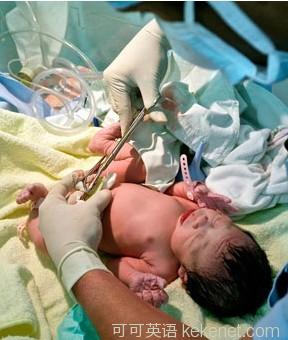(单词翻译:单击)

Science and Technolgy
科技
infantile anaemia
婴儿贫血
Blood simple
简单的输血
A small change in how babies are delivered might abolish infantile anaemia
分娩方式的简单改变可能帮助消灭婴儿贫血
CHILDHOOD anaemia is a problem. Around the world, almost a quarter of under-fives suffer from it. And anaemia is not a trivial thing. A child's development, both physical and mental, is stifled by a lack of iron. The reason is that, besides its well-known role in haemoglobin, the oxygen-transporting molecule in the blood, iron is also involved in many aspects of brain development.
儿童贫血症是一个全球性的问题,将近四分之一的五岁以下儿童忍受着该病的折磨,使得我们无法忽视它。儿童身体和智力的发育,都会受到铁元素匮乏的影响,因为除了在血液中的氧气运输分子——血红蛋白中发挥着众所周知的作用外,铁元素还在许多方面参与了大脑的发育。
A study just published in the British Medical Journal by Ola Andersson, an obstetrician at the Hospital of Halland in Halmstad, Sweden, suggests that a simple change of medical procedure when a child is born may bring a big reduction in anaemia. That change is not to cut the umbilical cord linking the child with the placenta straight after birth—as is standard practice—but, rather, to give it time to transfer more of the placenta's contents (particularly its blood) to the child it has been nurturing.
来自瑞典哈尔姆斯塔德市哈兰医院的产科医生Ola Andersson刚刚在不列颠医学杂志上发表的一项研究表明,简单改变婴儿分娩的流程,也许就能显著降低贫血症的发生。这个改变是,不要像惯常操作那样,在胎儿出生后马上剪断连接胎儿与胎盘的脐带,而是等一等,让更多胎盘中的物质(特别是血液)流向胎儿。
The argument in favour of rapid clamping is that too much blood may flow from the detached placenta to the newly born child, and that this can cause problems of its own. But that is unproven, and would be a strike against evolution because, in nature, the umbilicus of a mammal usually does remain attached to the infant for some time after birth. Only the modern technology of clamps and sharp scissors permits the slithery tube to be dealt with at speed.
坚持快速钳住脐带(速钳法)的观点认为,让太多的血液从胎盘流向新生儿会带来其自身的问题,但这种观点其实从未被证实,而且显然与进化论相抵触,因为在自然界中,哺乳动物的胎儿通常在出生后一段时间内仍然通过脐带与母体相连,只有钳子和剪子这种现代工具,才能迅速地处理光滑的脐带。
To test her idea that extended post partum connection to the placenta is good for a child's health, Dr Andersson and her colleagues recruited 334 pregnant, non-smoking women whose fetuses appeared to be healthy. When these women came to term, their midwives followed one of two sets of instructions, chosen at random and given to them just before each birth. In 166 cases the newborns had their umbilical cords clamped within ten seconds of delivery. The other 168 had them clamped after at least three minutes had passed.
为了证实延长产后胎儿与胎盘的连接时间确实有益于儿童的健康,Andersson博士和她的同事们招募了334个没有吸烟习惯的孕妇志愿者,她们肚中的胎儿看起来都很健康。在孕妇们临产时,助产士为她们从两种生产方式中随机选择一种。在166例中,脐带在新生儿出生后的十秒内被钳住,而在另一组168例中,这个时间至少超过三分钟。
When the children were four months old, Dr Andersson re-examined them and took a blood sample. Those babies whose umbilical clamps had been applied after three minutes had, on average, iron levels 45% higher than those whose cords had been clamped immediately. Put another way, only 0.6% of them were anaemic, compared with 5.7% of the rapidly clamped.
在这些儿童四个月时,Andersson博士重新对他们进行检查并抽取血样。那些脐带在三分钟后才被钳住的儿童,体内的铁元素平均水平要比采用速钳法的儿童高出45%。从另一个角度看,相较于采用速钳法的儿童中5.7%的贫血症发生率,他们的这个比例只有0.6%。
Rapid clamping of the umbilicus, then, seems to cause one child in 20 to become anaemic, at least in the early months of its life. Any experiment of this sort needs to be repeated, of course, to check it is correct. But if it is, then the burden of proof in the matter of when to cut the cord will have shifted from those who would cut late to those who would cut early. The cost of doing so would seem negligible; the benefit, great.
看起来速钳法在每20个儿童中便导致一例在其出生后的最初几个月内发生贫血。当然,这类研究结果都需要通过重复实验来验证可靠性。但如果这个结论确实正确,那么采用速钳法的人将更有义务来证明为什么要迅速的剪断脐带,毕竟延长几分钟时间没有什么麻烦,而益处却是显而易见的。


